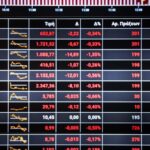In public discourse, the European elections are treated as a “second -class” elections, given their apparently poor influence on the domestic political scene and on the daily lives of citizens. In the 1980s, this perception was particularly widespread as the process of political unification of the EEC was still at a fetal stage, while the European Parliament had no substantive responsibilities, at least until 1986, when the single European act came into force. In this context, it does not impress the fact that the European elections of June 17, 1984 have been overshadowed in the collective memory and analyzes of the period, by the highly polarized clashes of the 1981, 1985 and 1989 parliamentary elections. Nevertheless, the thorough examination of the dynamics of that time of the age of 17 with a significant impact on later political developments.
The political context
The brief analysis of the following are presented by the main ones, with emphasis on the timing of the elections, the characteristics of the vote and the impact of the results on the strategy and internal processes of the two parties of power and in particular the New Democracy. However, it is important to make some introductory observations on the axes of political competition and the issues that dominated Greece and Europe from 1983-1984; that is to say, the broader historical and political context of the showdown. At European level, the main dispute of the period was the approval of the spinel plan, an extremely ambitious proposal for the transformation of the EEC into a quasi -federal union with its own constitution and institutions, which would cover an extremely wide range of responsibilities, from economy and monetary policy.
The plan was voted in voting by the European Parliament in February 1984, but hit strong reactions of a series of countries, including Greece, which believed that the federation of the EEC threatened their independence in critical areas. The reservation shown by the Papandreou government towards Spineli’s proposals and the raising the issue of national sovereignty in a central at-law in question affected public opinion on the eve of the European elections, reinforcing Eurosceptic tendencies within the electoral body. According to available data (Eurobarometer, No. 17-32), this dynamic was nevertheless short-lived and, although it was probably favored by PASOK, it was in no way a substantial factor in forming the results. This is due to two reasons. Both the New Democracy and personally Evangelos Averoff, though obviously in favor of the country’s European course, did not share Spinelli’s federalist zeal, considering many of his proposals early. Therefore, the distance with PASOK on this issue was practically small, which in turn favored the shift of political interest from European issues to domestic policy issues.
Parties’ strategies
This was the most contributed and the time to hold the European elections a year before the 1985 national elections. The short distance between the two matches gave the first qualifying round, while shaping the conditions of a prolonged and extremely polarized pre -election period.
In this context, PASOK attempted to turn the June 17 ballot into an informal referendum in favor of the Change program, while the New Democracy adopted the slogan “Exemption” as its central point, attempting to capitalize on its misery and unhappiness.

As far as the smaller parties are concerned, the KKE attempted, as in the 1981 elections, to be presented as an integral part of the political bloc of Change, avoiding rupture with PASOK, while the KKE and KODISO attempted to differentiate themselves from the European diploma forces. Finally, the EPEN attempted to express the hard core of the Greek far right by proposing nationalist – anti -communist slogans and the demand for the release of the leaders of the dictatorship.
The centerpiece was marginalized
The results have captured three main dynamics: enhancing the bipartisanship at the expense of polarization, PASOK’s hegemonic position within the party system and the gradual recovery of the New Democracy’s electoral influence. Compared to the 1981 European elections, PASOK rose 1.46%to 41.58%, while New Democracy reduced the difference between 5.25 points, reaching 38.05%. The KKE and the domestic KKE fell slightly 1.20% and 1.88% respectively, while EPEN secured its entry into the European Parliament with 2.29%, slightly higher than 1.96% that the Spyros Markezini party had received in the previous European elections. KODISO was soaked electorally, receiving 0.8% against 4.26% in 1981; a clear indication of the complete marginalization of the political center, for the benefit of the forces of dualism.
PASOK, ND and there were rises, KKE and KKE you. Lightly decreasing, KODISO was trimmed.
In addition to the general trends, the most interesting element of this match was the shifts recorded in terms of the social characteristics of the vote in the two major parties. Compared to the 1981 European elections, PASOK strengthened its percentages in both urban and semi -semi -regions, while remaining dominant in rural rural strata. However, if we compare the results of the 1984 European elections with the 1981 parliamentaries, there is a spectacular retreat of its electoral influence in the major constituencies of Athens, Piraeus and the First Thessaloniki, for the benefit of New Democracy. This dynamic will crystallize in next year’s parliamentary elections, marking a tendency to homogenize the vote of New Democracy, mostly relying on: a) on the significant expansion of its influence on the middle classes of cities and b) the repatriation of the 1981.

It is also worth noting that in the 1984 European elections, a clear political conversion of the Muslim minority was recorded, which played a decisive role in the electoral sovereignty of New Democracy in the Thrace region for about a decade.
Dominance of the block of change
These developments have partially turned to electoral correlations, but did not doubt the political sovereignty of the bloc. This was largely due to the inability of the New Democracy to interfere with PASOK’s influence on the crucial political and electoral area of the center. The Conservative Folding of the Party under the Presidency Evangelos Averoff has been catalytic in this regard, creating, as well as noted by George Mavrogordatos, the conditions of a quasi -self -esteem of the New Democracy at the right end of the political spectrum, 1982). This was also contributed to the political profile of Averoff himself, which, unlike George Ralli’s moderate conservatism, was thought to express a more aggressive and ideologically unmistakable portion of the traditional pre -dictatorial right. Seeing the political boundaries of this strategy and still having a fresh defeat in the European elections, the New Democracy parliamentary group attempted in September 1984 a radical rearrangement of the party’s political stigma, electing President Konstantinos Mitsotakis.

Planning of ND
Coming from the Center Union, Mitsotakis was regarded as the most appropriate choice to broaden the party’s appeal in the middle space and to align the New Democracy with the liberal tendencies that dominated the European center -right at that time. Opera and it was. Just four months after his election, the new President of the New Democracy presented an ambitious ideological -political neoliberal manifesto entitled “A New Proposal of Freedom”. Although the impact of this particular declaration on electoral competition should not be overrated, it is clear that the conversion of the New Democracy and the extremely polarized climate of the long election period has a catalytic effect on PASOK’s policy. Seeking to highlight its ideological -political differences with Agenda Mitsotakis, but also to maintain its privileged relationship with the popular strata, the Papandreou government adopted inelastic positions in the field of economic policy, which did not allow it to take timely. This option derailed public finances from 1983-1985, posting the government to take hard restrictive measures on the basis of the Semitic Stabit program. In this sense, the 1984 European elections had not only direct but also indirect consequences, which played an important role in later political developments. Unlike the 1981 and 1989 European elections, they were therefore a major, albeit largely forgotten, chapter of modern political history that deserves our attention.
*Mr. Angelos Kontogiannis-Mandros is a postdoctoral researcher at Panteion University.
*Curated by: Evanthis Hatzivasiliou








